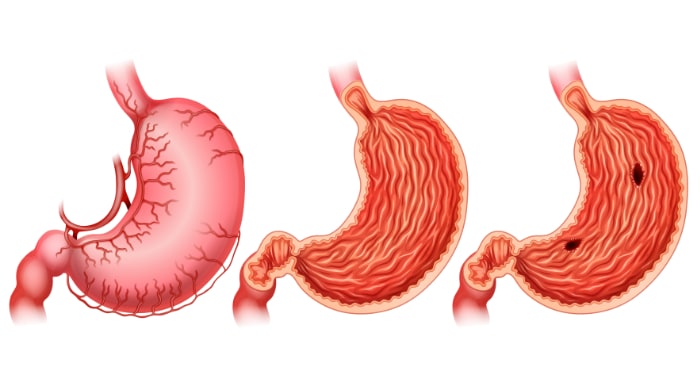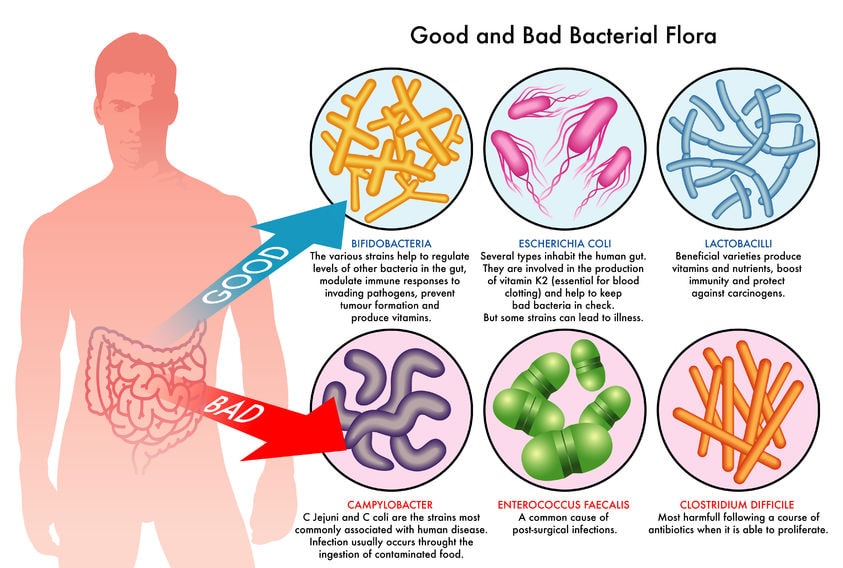
Leaky anything never sounds good: Pipes. Faucet. Radiator. Can you think of a situation where leaking is a good thing? I can’t think of one. The worst leak of all, one that affects millions of people’s health and happiness is leaky gut.
How Do You Fix Leaky Gut?
Fixing a leaky gut isn’t easy and it takes time. Unlike calling a plumber, you can’t call a GI handyman to fix it fast. This is especially true if you’ve been experiencing the above symptoms for many years.
The first step in conquering leaky gut is to stop it from leaking more. And to do that, you need to stop eating and drinking things that will continue to weaken it. For this, I recommend two options. The more accurate but more expensive way is to get a food sensitivity blood test. That takes the guesswork out. If you want to go the cheaper but longer route, follow an elimination diet. That’s where you avoid all potential allergenic foods like gluten for at least 4 weeks and then reintroduce them one by one to see if you have any allergy symptoms.
There are certain foods like bone broth and collagen protein that may actually help repair the gut lining. But you can’t just sip a cup of bone broth and continue eating allergenic foods expecting miracles.
As a certified nutrition therapist, I wish I could work one on one with you to help repair your gut. But one recommendation I have for you—besides replacing the typical American breakfast every day with my Organic Green Drink—is working with a functional medicine doctor or naturopathic doctor. Through diagnostic testing and supplement recommendations, these natural health experts can help you overcome leaky gut and get you living your best life. It’ll cost a pretty penny but isn’t looking and feeling your best worth it?
Gut: Not The Same As Belly
You’ve probably heard of leaky gut but aren’t quite sure what it means. In order to understand what leaky gut is, it’s important to first understand what the gut refers to.
Many people think the gut is the stomach or abdomen. But your belly is just a small part of your gut. Your gut, or gastrointestinal (GI) tract actually begins in your mouth. Digestion begins even before you take the first bite of food. When you so much as look at or even smell what you’re about to eat or drink, saliva starts forming, ready to soften food for transit down the digestive tract. Eventually, what you eat is eliminated through your backside, which is where the gut ends.
So now that you have a clear definition of what the gut is, let’s focus on a specific area of the gut that heavily influences your immune system, mood and overall health…
Your intestines are home to trillions of bacteria. It’s also here that 80% of your immune cells reside. Some people believe that in order to have strong digestion, you need a strong stomach. But actually, the part of your body that has the most influence on your health is called the intestinal mucosal barrier.

The Mucosal Barrier & Gut Health
Years ago, when I first heard the term mucosal barrier, I was kind of grossed out. When you hear the word mucus what do you think of? Disgusting runny noses, right? But it turns out that mucus is one of your best friends. Your intestines are lined with a mucosal barrier. This barrier protects you from potentially-disease-causing pathogens like harmful bacteria, viruses, fungus, etc. In addition, the barrier interacts with immune cells, absorb nutrients and is also responsible for directing waste out of the body.
Your mucosal barrier is lined by epithelial cells. A healthy mucosal barrier has tight junctions between the cells.
Leaky Gut Explained
So here’s where we get to leaky gut. Because of several reasons I’ll mention in just a sec, the tight junction can weaken over time. And when this thin intestinal mucosal wall leaks now you have a leaky gut. What exactly is leaked? Undigested food particles, toxins and microorganisms (bacteria, etc.).

What Happens When You Have Leaky Gut?
Bad things. Autoimmune disorders can arise. A weak gut lining can cause rheumatoid arthritis, lupus, fibromyalgia, Crohn’s Disease, Ulcerative Colitis, Irritable Bowel Syndrome and other imbalances in which the body attacks itself.
Why does the body attack itself? It’s because when these undigested food particles, toxins and bacteria flow unimpeded through the bloodstream, the immune system mounts a defense and tries to destroy them. This creates a high inflammation response in the body, leading to painful joints, skin and digestion problems and more…
Why Hasn’t My Doctor Told Me About Leaky Gut?
Because leaky gut isn’t an officially recognized medical disorder. The closest thing to it is “intestinal permeability.” But in order to get diagnosed with that, you need to undergo a biopsy, in which a slice of your intestinal tissue is removed.
There is a bit of a chicken and egg scenario with leaky gut. Did the weakening of the mucosal barrier cause an autoimmune disease or is it the other way around?
I’m convinced that because of various factors, leaky gut causes inflammatory conditions, not the other way around.

Symptoms of Leaky Gut
You don’t have to have an autoimmune disorder to have a leaky gut. Other signs that your intestinal wall has gotten weaker include:
- Brain fog
- Constipation
- Insomnia
- Fatigue
- Feeling cold
- Bloating
- Gas
- Acne, eczema and rashes
- Anxiety and depression
Causes Of Leaky Gut
If you have any of the above symptoms do you relate to any of the following causes?
- Frequent antibiotic use
- Gut dysbiosis (not having enough friendly bacteria, having too many harmful bacteria)
- Chronic stress
- Exposure to harmful chemicals like glyphosate
- Excess alcohol
- Consuming too much sugar
- Eating foods to which you are allergic or sensitive, e.g. gluten, dairy. (This is also a chicken or egg question: are you allergic because of leaky gut or did leaky gut cause the allergy? Hmmm.)
There are other causes of leaky gut but these are by far the most common.
